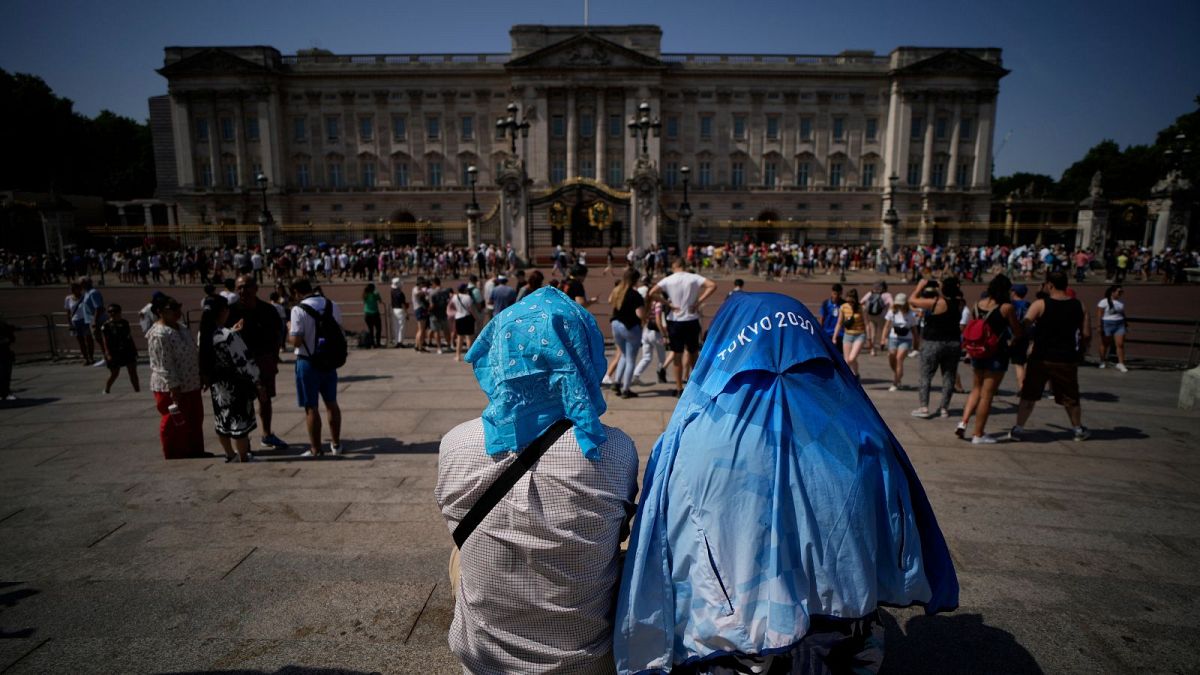On June 28, 2021, a heatwave saw temperatures rise to over 42 degrees Celsius (108-degrees Fahrenheit) in Seattle, the hottest ever recorded in the US coastal city. On that day, Juliana Leon was found unconscious in her car and died soon after from hyperthermia — the overheating of the body.
Now her daughter, Misti Leon, is suing seven oil and gas companies for wrongful death in a Washington State court. She alleges that they accelerated the extreme heat that led to her mother's death by manufacturing and marketing fossil fuels.
The filing claims the companies — including ExxonMobil, Chevron, Shell and BP — had known for decades "that their fossil fuel products were already altering the earth's atmosphere."
These defendants willfully created a "fossil fuel-dependent economy" that would result in "more frequent and destructive weather disasters and foreseeable loss of human life," the complaint alleges.
 Record temperatures continued into the evening on June 28, 2021 in Seattle as some residents, including Juliana Leon, succumbed to severe heat stressImage: Ted S. Warren/AP/picture alliance
Record temperatures continued into the evening on June 28, 2021 in Seattle as some residents, including Juliana Leon, succumbed to severe heat stressImage: Ted S. Warren/AP/picture allianceIn the first wrongful death claim of its kind, a win for Leon would "represent a landmark shift in climate litigation," said Maria Antonia Tigre, director of Global Climate Litigation at the New York City-based Sabin Center for Climate Change Law.
While very few cases have "awarded damages" in climate litigation, success in Seattle could see individuals seek "compensatory and even punitive damages" from fossil fuel corporations for their role in climate change, Tigre explained.
Besides seeking damages, the plaintiff also wants the defendants to fund a "public education" campaign to rectify "decades of misinformation" — which Leon says has fueled "consumer confusion" about the link between burning fossil fuels and planetary heating.
Chevron, BP, Shell and ConocoPhillips did not respond to a DW request for comment on the case.
What heat waves do to our bodies and brains
Big Oil rejects claims in case
The Chevron Corporation, one the world's largest oil and gas producers, rejects the claims made in the lawsuit.
"Exploiting a personal tragedy to promote politicized climate tort litigation is contrary to law, science, and common sense," Chevron spokesperson Theodore Boutrous Jr. said in a statement to US public broadcaster, NPR.
"The court should add this far-fetched claim to the growing list of meritless climate lawsuits that state and federal courts have already dismissed," he added.
But according to Tigre, the case "could create a novel but plausible basis for liability." The filing is based on tort law as opposed to national statutes such as emission regulations that have underpinned most climate litigation cases.
Inside the oil industy's massive lobbying efforts
Tort law claims seek damages for individuals impacted by climate change, noted Rebekkah Markey-Towler, a research fellow at the Melbourne Climate Futures think tank.
In the past, such civil lawsuits have been a vital means for individuals to "seek redress" against big tobacco or asbestos companies, the researcher explained. A Pennsylvania man was awarded $3.8 million (€3.5 million) from his employer in 2024 for contracting mesothelioma due to asbestos exposure. Climate cases are "no different," she added.
"Big Oil companies are already facing climate fraud and damages lawsuits from dozens of state and local governments," noted Alyssa Johl, vice president of legal and general counsel at the Center for Climate Integrity, a US-based climate think tank.
But as this latest case is "the first filed on behalf of an individual climate victim," she said, it represents "another step toward accountability."
Markey-Towler said prior tort law climate cases — even those in other countries — could be "tangentially relevant" to this claim.
In 2015, a landmark Dutch climate change lawsuit known as the Urgenda case, employed the tort law principle of "hazardous negligence" to argue that government inaction on climate change constituted a breach of its duty of care towards its citizens. The ruling forced the Dutch government to raise emission reduction targets.
A more recent case in Germany where a Peruvian farmer sued energy giant RWE for its contribution to the glacial melt and flood risk posing a danger to his house, was another attempt by an individual to seek climate damages.
"While the case did not succeed at the merits stage, the court acknowledged that, in principle, a private emitter could be held liable for a proportion of the damages," Markey-Towler noted of the final judgement in May.
 Peruvian farmer Saul Luciano Lliuya's lost case against RWE still upheld the principle that a fossil company can be be held liable for climate damageImage: Alexander Luna/Germanwatch e.V.
Peruvian farmer Saul Luciano Lliuya's lost case against RWE still upheld the principle that a fossil company can be be held liable for climate damageImage: Alexander Luna/Germanwatch e.V.'Attribution science' key in proving responsibility for heatwave
The science of weather attribution, which estimates the probability of climate change making extreme weather events such as wildfires, floods or heatwaves more likely, will "be central to the case," said Tigre.
The 2021 heatwave along the US west coast — dubbed the Pacific Northwest Heat Dome — would have been "virtually impossible" without human-made climate change, according to rapid analysis at the time.
The record temperatures that continued for three days would have been "at least 150 times rarer" without climate change, the research noted.
Estimated to happen only once every 1000 years, such extreme heat would instead occur around every 5 to 10 years if, as predicted, global temperatures rise 2 C (3.6 F) by the early 2040s.
Temperatures soar in Pakistan heat wave
Heat is called a "silent killer" and caused the deaths of 489,000 people annually between 2000-2019, noted a 2024 UN report. The Pacific Northwest Heat Dome event resulted in around 850 deaths related to high temperatures across the US and Canada.
But Tigre says the problem for Misti Leon's claim against the oil companies will be convincing the court of the defendants' "specific" contributions to global emissions.
"Even if we are able to say that climate change caused an event, how much did one company contribute to this?" asked Markey-Towler. "That's difficult."
A potential 'new wave' of litigation
Nonetheless, she says "health arguments" are becoming common in climate lawsuits, which now number nearly 3,000 in the US and around the world, according to the Climate Change Litigation Database run by the Sabin Center for Climate Change Law in New York.
If the Washington state case is successful, it would establish a landmark precedent "directly connecting the actions of fossil fuel companies to harm suffered by individuals," said Markey-Towler.
Evolving legal theories such as "climate homicide or corporate manslaughter," which take the step of seeking a criminal as opposed to a civil conviction, could be helped by a successful trial, noted Maria Antonia Tigre.
"Such a precedent would likely spark a new wave of litigation," she added.
Edited by: Jennifer Collins








 English (US) ·
English (US) ·